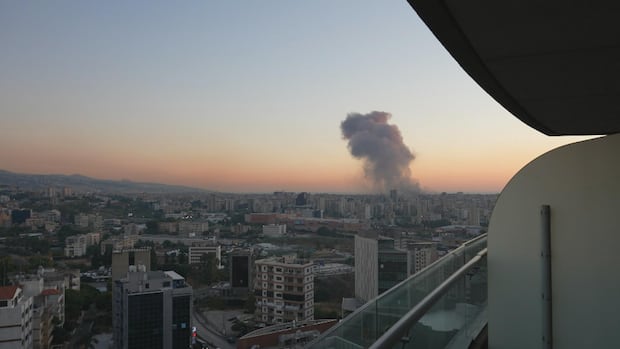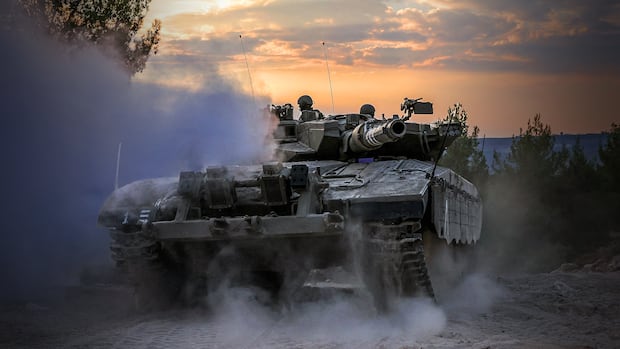
Beirut is a city well used to the rhythms of crisis and conflict, able to shutter itself and open up again when danger passes, like a turtle or a hermit crab
But in the time since Israel’s assassination of top Hezbollah leader Hassan Nasrallah on Friday in Beirut’s southern suburbs, the Lebanese capital still looks and feels as though a tornado has passed through it — open and raw.
Dazed residents who fled the densely packed neighourhoods surrounding the bomb site where the Israeli military says Hezbollah maintained a major command centre have flocked to the city centre.
Adults and children have been sleeping outside in parks or along the city’s famous corniche. Others are on the move, with their belongings stuffed into garbage bags or suitcases.
“I’m very tired and I’m very sad,” said Abu Alim, a father of five and a grieving Nasrallah supporter, sitting on the steps of the Mohammed Al Amin Mosque next to Martyr’s Square in the centre of Beirut.
A few days ago, he was managing a bakery in the southern suburbs referred to as the Dahiyeh, known as a Hezbollah stronghold in Beirut.
“I don’t have a job. I don’t have anything. I don’t have a house,” he said.
It was too dangerous to go back, he said, even if his property was still standing. Israeli strikes have continued in the southern suburbs and other parts of Lebanon throughout the weekend.
‘We will rise again’: Mom of 2 who sent kids to Syria
Journalists have been unable to visit areas controlled by Hezbollah without the group’s permission, and some media teams have had their material erased or their equipment taken.
CBC News producer Jason Ho captured video of smoke billowing in Beirut Friday evening after a series of strikes on the Lebanese capital. Israel’s military said Friday it targeted the central headquarters of Hezbollah in Beirut.
At a news conference on Sunday, Lebanon’s Acting Prime Minister Najib Mitaki said the number of displaced Lebanese was nearing one million, the largest number the country has had to handle.
Samaa Ameiri Qais sat on the same steps as Abu Alim, alone and in shock. The 51-year-old seamstress had just put her 11-year-old son and 12-year-old daughter in a car heading for Syria where her sister lives.
They fled their home on Friday and slept on the street that first night. She said she didn’t go with her children because she couldn’t bear to leave Lebanon.
“We have faith that we will win despite everything,” she said. “I have faith that Hassan Nasrallah will rise again and we will raise the heads of Arabs.”
On Sunday, Hezbollah announced that emergency workers had retrieved Nasrallah’s body from beneath the rubble in the crater left behind by Israel’s bunker-busting bombs.
Hezbollah is regarded as a terrorist organization by many Western countries, including Canada and the United States.
For many Shia Muslims, not just in Lebanon but across the Middle East, Nasrallah was a revered religious figure and an important leader who built not just the most powerful militia in the country, but a social and political movement.
Many Lebanese people also supported him as a symbol of “the resistance” against Israel.
Call for unity as Lebanon declares 3 days of mourning
In the wake of the latest airstrikes, the Lebanese government has declared three days of official mourning beginning Monday.
But it also said it is increasing the presence of Lebanon’s national army in the capital, and the army has in turn called on the Lebanese people to maintain unity.
It serves as a reminder that while many Lebanese support Hezbollah, many others do not.
Some blame Hezbollah, and its backer Iran, for dragging Lebanon into another war it can ill afford.
“Nasrallah has single-handedly declared war on Israel,” historian Makram Rabah told CBC news during an interview at his Beirut home.
“The people responsible for the death of the Lebanese are certainly the missiles of the Israeli army,” said Rabah. “But at the same time, Hassan Nasrallah and Iran are also directly implicated in the death of Lebanese.”
After Israel launched its offensive in Gaza in the wake of the Oct. 7 attacks on border communities in Israel by Hamas militants, Hezbollah began firing rockets into Israel.
Rabah, a lecturer at the American University of Beirut (AUB), said Hezbollah has for years exploited Lebanon’s sectarian political system at the expense of the Lebanese state.
“I’m someone who believes that we need to reassess this whole sectarian system which allows for monsters such as Hezbollah or other factions to emerge.”
Lebanon’s political paralysis
The deep ridges of Lebanon’s sectarian divide were originally carved out in the 1940s after the end of French rule and further entrenched during Lebanon’s civil war from 1975 to 1990.
There are 18 recognized sects in Lebanon, and the three government positions of president, prime minister and house Speaker are split between a Maronite Christian, a Sunni Muslim and a Shia Muslim, respectively.
Failure to agree on candidates in recent years has led to political paralysis and the current interim government.
Some Lebanese worry that in the wake of Israeli attempts to eviscerate Hezbollah — up to now the most powerful force in Lebanon thanks to its militia and backing from its creator and patron Iran — sectarian tensions are bound to rise.
And that stokes fears of a potential return to civil war.
As tensions grow along Israel’s northern border with Lebanon, a top Israeli military official says troops are preparing for a potential ground invasion targeting Hezbollah military outposts. Andrew Chang explains what a full-scale invasion would look like and why many world leaders are fearing the worst.
Images supplied by Getty Images and Reuters.
Some news agencies report there’s pressure from Hezbollah supporters on store owners to close their businesses during three days of mouning after Nasrallah’s death.
Rabah, however, believes this is an opportunity to promote national unity, especially in terms of the many Shia pushed from their homes in the south and other parts of Lebanon by the fighting.
“I think it is a duty of all Lebanese to make them feel that there’s a kind of a national safety net,” he said. “But ultimately one has to understand that these people will be permanently displaced until we come to a place where we say we need to reclaim Lebanon and its sovereignty by saying immediate ceasefire, and not actually just blaming the Israelis. We have to be very clear that we don’t want to be part of any [Iranian] axis whatsoever.”
Mitaki said Sunday there was no choice for Lebanon but “the diplomatic option.”
What’s not clear is whether the Lebanese state has any say in that at all.

